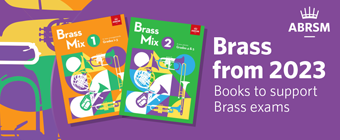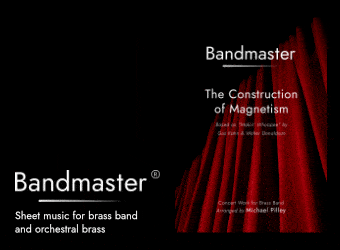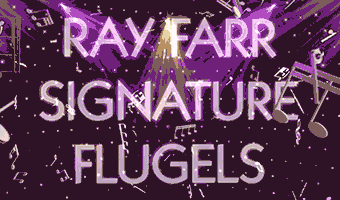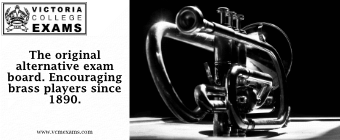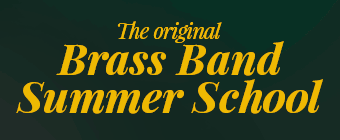A lone bloke in a mac...
I suggest to Mr Black that if he disapproves of applause/whistles on the last note of a piece at a band contest he is not exactly entering into the spirit of the event.
I can't imagine Fairey's ‘Carnival Romain’ or Dyke's ‘Journey into Freedom’ years ago were met with polite applause after the last note - they were ground breaking performances given the reaction they deserved.
I suspect most conductors would be well pleased to have this reaction to their performances and many would no doubt prefer this situation than playing in a bandstand to a lone bloke in a mac with a dog on a wet Sunday afternoon!
Sometimes it upsets the dog as well!
Bands have won or lost the contest well before the last note (and even lost it on the first note): So Mr Black - be thankful you've got audiences at all, and more importantly, willing people giving up their time to organise the contests.
Mike Ward
Adelaide
A different view point
There are many views being expressed with reference to the up-coming anniversary of the 1984 Miner’s Strike.
Perhaps one additional aspect is those of us who were brass players and Police officers.
I was a Police officer in Lancashire from 1975 to 2005 and at the time of the strike, a player with the then TDS Lancashire Brass.
I spent almost a year, with hardly a day off, policing the strike, and worked at places like Point of Ayr, Brodsworth etc and many others including the demonstrations at Orgreave and Sheffield.
Many will say I was well rewarded, which was true, but the effect on my personal esteem, marriage and playing was considerable.
It's hard to describe the feelings of awe and regret I had when policing famous brass band sites – and what a pity I had to view them from an opposing position.
I had, and still have, the ultimate respect for those who tried so hard to keep their jobs and communities viable.
Dave Aston
At your peril!
Change the format of the National Championships at your peril.
Bands have always strived to qualify for the Royal Albert Hall Finals. If that is taken away we will have the ‘Elite’, plus a lowering of interest in all of the rest of Banding.
Will we just have the same old few, pinching players from the other bands and no interest at the regionals.
Surely the British Open suits your requirements?
Why change something that has worked for the amateur musician for decades. If they started having musical test pieces instead of mathematical exercises for players and listeners the halls would start to fill as in the fifties and sixties.
Banding is about everyone, not just the Elite.
Graham Shelley
Doing the job
Your observations concerning ‘St Magnus’ as the area qualifying piece for Championship Section bands is well made.
It was and is, a very difficult test for the very best bands, so it was a given that some Championship contenders would struggle.
However what is clear is ‘St Magnus’ did the job!
The very best bands qualified from each area ensuring the final at the RAH is likely to be the best for many years - it is also likely to be close to a sell out.
Ensuring the very best bands qualify for the finals are surely the reason for the Area qualifiers, so a huge well done to the Music Panel.
Prior to me joining my current band I had been playing for a very good band who were in the main a supporting act to the big boys. Winning the area twice in 15 years was a greater thrill for us because we worked hard to overcome the higher ranked bands.
Interestingly the first reaction was not where we would be playing in October but who we had beaten.
I well remember the talk in the bandroom was always how we could beat these bands. What could we do to improve our chances?
If anyone had told my band we were dropping into a newly formed lower league because we were not good enough there would have been a riot!
The point I make, is the standard of the better bands improves the performances of the other bands in the Area – and it’s not an overnight improvement either!
Bands have to adjust to the higher standard but the promotion/relegation rules leave little time for the bands to adjust.
Forming an Elite Section is unlikely to improve the standard of the bands in the bottom rungs of the Championship Section: My guess is it will just widen the gap very much like the top 6 in the Premiership of football.
Higher class competition improves standards across the board as a general rule.
I go back to the question I raised in my March letter: What can we do to assist those bands who consistently struggle at Championships level (and maybe we should include all sections)?
Isn't this an opportunity for Mike Kilroy and others in similar positions? Would a national template with the objective of providing an opportunity for all players to improve (subject to them wanting to of course) be the answer?
Segregation will not fix the issue, but providing an opportunity for improvement might go some way to bridging the gap.
Craig Williams
Dudley
Losing audiences
In respect to Mr Black’s recent comments.
This is not a recent development, as it has been happening almost as long as contesting.
As a youngster listening to bands such as Fairey Aviation, Dyke etc, the atmosphere was electric.
From the moment they took the stage everyone was on the edge of their seats, and more often than not standing - whistling and cheering well before the end of the piece - assuming they had produced a performance worthy of their reputation.
It never seemed to detract from the audience enjoyment, indeed they felt a part of the performance, or so it seemed. Nor did it seem to affect the adjudications; maybe the judges had reached their conclusion before that point.
When the test piece had a quiet ending (eg; Resurgam), the audience always seemed to know not to erupt before the final notes had disappeared - as if to add to the atmosphere. I do not say it shouldn't happen, but if the audience AND the competing players enjoy it, AND the adjudicators can handle it.
Why not?
In reply to Graham Ruecroft:
It may be true that adjudicators attempt to discount the visual element. Interestingly, in 1990 at the National Finals there was an experimental panel adjudicate outside the box.
In the box it came out; CWS Glasgow, Foden’s, Sellers, Leyland. Many were shocked, in particular with the absence of Black Dyke, from the first four, especially when the visually aided did include them.
Could it be the judges out of the box were influenced by the Dyke uniforms and big name players?
Were they preconditioned to expect a brilliant performance?
Finally, though the standards of our bands may have dropped since the demise of ‘Works’ bands -
the music in my opinion has become more technical and less tuneful or melodious.
The technicalities of millions of notes a minute and the increase in discordant chords have resulted in diminishing attendances from followers like me.
I no longer can understand the complexities. The worst part of listening at contests is to hear the lesser bands struggling so much with the demands placed upon them by the pieces.
At least with an own choice, as Sandy Smith suggests, the bands will play something within their reach and usually enjoy it.
So reluctantly, after many years listening I am struggling to force myself to attend....in fact I have already given up on the Open and the National Finals.
What hope has the movement of attracting new blood, when the movement is driving them away? I do not know the answer, and frankly almost past caring.
I do live in hope though.........miracles do happen don’t they?
John Horrocks
Rabid generalisations
It is little short of a rabid generalisation to suggest that the recent Regionals separated the excellent from the mediocre!
It does not allow for anomalies; temporary fluctuations in band personnel, nor acknowledge the critical role that professional MD’s can have on a band’s performance.
It’s facts and a serious concern with the future of banding, not ‘sour grapes’, which prompts my comments.
The winners of the NW Region, Fairey’s, have not made any impact in contesting for a few years; Mareka Grey has done wonders with Milnrow, and Co-op have come on leaps and bounds.
So how insulting to those bands to suggest they are second string, just because they failed to qualify in a region which could only fill 2 places.
Leyland Band had lost an entire trombone section, top chair and front row cornet in the months around Christmas. They failed to qualify, but went to Blackpool on the back of seven sell-out concerts!
Let’s have a bit of straight talking here: As in football ‘money matters’. You can have an Elite Premiership Section if you want, but it will have to continue to be privately funded.
Contesting has done what it was supposed to do: It has made bands ‘up the ante’; improve their playing and make them far more listenable. To restrict it to a platform for the ‘Elite’ to contest would be extremely damaging to the whole movement.
Contesting is just part of the picture: It cannot, and should not stand alone.
You contest to improve standards: If along the way you score a minor victory by beating and old time rival, fine! But for god sakes look around the halls.
Until the re-introduction of more melodic test pieces in the past three years you have been playing to shrinking audiences....I am wondering what will happen to Brass in Concert as it moves away from the Entertainment emphasis?
I spoke with attendants at a recent concert, one of a series at Morley Town Hall. They told me that only Grimethorpe could now command a large audience while a lot of other ‘elites’ were filling less than a third of the hall.
You ask what we should do to encourage the Government to increase funding to banding.
Perhaps we should stop looking up our own backsides and putting such an undue emphasis on ‘Elite’ contesting and try to answer the conundrum of how we still manage to attract many quality young players while our audiences are fading into their graves.
How can we get out to young people as listeners; how can we demonstrate the value of ‘our living heritage’, to a younger audience and our politicians.
Is it not a little odd that the same Government that has just decided to agree to the formation of three military brass bands that deny the value of the same music form to the British public, whose taxes are paying for those three brass bands?
Indeed, is that not the nub of the whole business?
I believe that the first thing we can do, is to start becoming politically more active, lobby your MP’s and local councillors; write to them; go along to their local public meetings and consultation sessions; invite them to be patrons of their local band.
If we are to convince politicians that brass bands should be supported we need to get out there and prove it both locally and nationally.
Jim Doran
No news good news?
I attended the Regional contest in Bedworth, and have to say that it was a case of, ‘no news is good news’ I think, outside the confines of the brass band world.
The event was well organised and the bands played very well too - from Championship Section to Fourth - although I was intrigued by the hospital-style identity bracelets!
However: How on earth, at contests, where every note should count, is it tolerated for the audience to pitch in with applause and whistles before the last chord has finished being played?
It's bad enough at any musical performance, spoiling the composer's and conductor's intention for the ending, but at brass band contests it has in certain cases become mindless.
For the vast majority of bands the silence rule was well followed, even with young children present, but for those with, shall we say, a keen competitive element, it went well above even good musical manners.
Good music making includes reflective silence - even if it is for a second.
I am not sure why applause of such an inappropriate nature is encouraged, as I am also sure it does not affect the judgement of the adjudicators (hopefully not anyway)
David Black
Not broken?
I was pleased to read Sandy Smith’s well thought out letter from the March comments.
I totally agree with own choice tests for lower section bands. Why not?
Let the band choose appropriately, allow good adjudicators to choose the best band, and let a broader based audience enjoy. In fact, let the men and women out of the box.
I agree with Tony Nash. I doubt our best adjudicators (are there poor ones?) will allow a visual element to inappropriately counter a more important musical facet of a band’s performance.
Perhaps one of them can comment why the curtained box is still with us at any level. It is outdated, perplexing to non-bandsmen or occasional visitor to a contest, and just plain stuck somewhere in the past.
But hey, it isn’t broken is it?
Well according to Graham Rix isn’t. How anyone can criticise Kenneth Downie’s magnificent ‘St Magnus’ bemuses me, and I’ll guess countless others.
One thing that is inspiring about brass bands around the progressive world is the fantastic quality of the test pieces by wonderful composers. ‘St Magnus’ is both a demanding and an outstanding work and worthy of every bar, time signature (the 4BR editor a few weeks ago made a clear case for the required time signatures in the piece, and that is what the composer wanted), sharp, flat, cadenza, chord, and every accolade to the very best bands that could actually play it.
Have we taken technical challenges too far if the best bands can handle them? No we haven’t.
Sandy makes another excellent comment in saying that that only the best championship bands can really play ‘Epic Symphony’, ‘A Kensington Concerto’ and ‘Energy’, etc. etc. Let us please accept that.
I remember a few years ago ‘The Force of Destiny’ was used for the best First Section bands at the finals. Yes, all bands played it didn’t they? Early this year ‘Energy’ was a tough test for our ‘B’ Championship bands at Butlins.
Did they all play it to a true championship level?
Robert Barnes also makes a clear case for an elite/premier division - not to exclude, but to create a true top level to aspire to.
I concede that the British Open goes part of the way to get the best UK bands together (insufficient bands from Europe or the US to my mind) with its Spring Festival underpinnings; but not all Open performances are true premier class.
Sandy also makes a good suggestion of using pieces that bridge the technical gap between the Championship and First Section works used this year. Frankly, I would like to see more own choice contests for top section.
We had the English Nationals where this was introduced, mirroring the European format. What a great contest it was, but we quickly eliminated it by not turning up to watch.
As Sandy says, we will remain ‘pickled in aspic as countries around Europe and further afield develop apace leaving us further and further behind’.
Graham Ruecroft
Snap happy
I feel Graham Jacklin is owed an apology for the bad practices of some of the photographers at Bradford.
We do need to get as many different images as possible - however, the nature of our environment means we should be aware that we have members of the public to consider.
Mr. Jacklin is correct in his assertion about the number of images being taken. In nearly 40 years of being a photographer I have rarely found multiple bursts of images produce that one great image.
As I spent most of the time in the choir stalls at Bradford and was certainly there for Carlton’s performance I know I remained quiet during the softer parts of other performances. I too heard the camera, which was set to multi burst and was surprised to see it came from one of our most experienced colleagues.
We have un- written understandings that we will endeavour to remain discreet at all events. In my case I generally wear black clothing, and soft shoes. My cameras lights and sensors are turned off, as is my cameras ability to fire bursts of images.
I try to restrict my movements during performances, and rarely leave or enter the hall while a band is playing, unless I know I can do it without anybody seeing me.
We do make errors, and in all the years I have been doing this job I have had a few embarrassing accidents, for which I have apologised afterwards.
I have no idea why someone felt it necessary to fire multiple shots during performances, however I will promise Mr. Jacklin I will remind my colleagues that we must consider the public when doing our work, and that if that means missing a possible good shot then that is nature of the work.
I would ask Mr, Jacklin and anyone else who feels a member of the press is acting beyond their professional remit to politely talk to the person involved ask them if they would be more considerate.
We are there to serve the public, and not spoil their enjoyment.
John Stirzaker
We need a premiership
I read with interest the comments on 4BR regarding the change needed to update the Brass Band movement.
My view is that there should be another section created for the best bands; a Premier section, which for example the top 3, 4 or 5 bands from the Championship Section should move to.
The reason is that it must be very depressing for the lower bands in the current Championship Section. They know only too well that they have little or no chance of beating the top few.
Obviously the quality of the top few bands in each region varies quite a lot, so the points awarded at contests should show this and could be used to choose the Premier Section.
Lynne Henry
Bemused by the Elite call
I'm bemused by those making arguments about creating an elite league. We have a system in place that works very well - just look at the healthy levels of entry in most areas.
The qualifying bands for the Championship final this year are the cream of their areas and this combined with last year’s top 4 looks like a great line up to me and should bring the crowds to The Royal Albert Hall.
I do agree however, with the argument about the difficulties of some of the tests that are being selected.
I'm afraid we have taken the technical challenges a bit too far, the test being more about pyrotechnics and extremities of instruments rather than music.
For example as a euphonium player I found ‘St Magnus’ a real range challenger, and doubted the merits of the cadenza in the context of the music.
It was played well by every band according to the adjudicators, but was it really necessary?
As for the time signatures; it was more an exercise in maths than music. Clever stuff yes, but music, well, I have my doubts.
Let's hope for something more musical in 2015, and if so, I would be minded to put a bet on with Paddy Power that the finals line up would not be much different to this year.
Graham Rix
Seven in the Morning
Fred Cox is trying to locate a tune called ‘Seven in the Morning’.
I think he is looking for ‘Morgens um Seiben’ (At Seven o’clock in the Morning) by James Last.
There is an arrangement by J.G. Mortimer, for brass band published by Editions Marc Reift, and another by Brian Winter published by Power Music.
The Mortimer arrangement is on the CD ‘Faireys Play Pop’ by the Fairey Band on the Marcophone Label, and the Brian Winter arrangement is on a CD by Brass Band Berner Oberland called ‘Cantaloop’ on the Power Music label.
Christy Smith
James Last may help?
I read that Mr Fred Cox has asked about finding a piece of music he believes would suit flugel horn.
I may be mistaken, but I believe the piece he is asking about could well be entitled ‘Mornings at Seven’ which was a 1968 release on Polydor by the James Last organisation.
The late, great Derek Watkins led the trumpet section of the band for the best part of 30 years and when performing ‘Mornings at Seven’ with James Last, the entire section of 4 all played flugel horns, not trumpets. The piece is essentially a flugel horn duet, with parts doubled.
There has been a brass band arrangement of this piece in existence (complete with obligato bass trombone part) for almost 30 years, but it was only ever handwritten to my knowledge, not a published set.
I apologise if this not the piece to which you refer.
Chris Wormald


